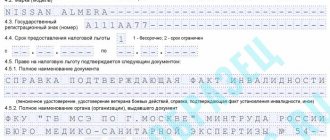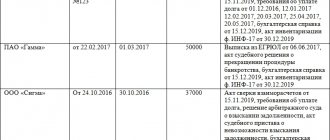The concept of statute of limitations in taxation
The tax statute of limitations is enshrined in paragraph 1 of Art.
113 Tax Code of the Russian Federation. This provision states: “A person cannot be held accountable for committing a tax offense if 3 years have elapsed from the day it was committed or from the next day after the end of the tax period during which the offense was committed until the decision to bring it to justice is made.” " As we can see, this provision establishes a limitation period only for liability for an offense, but does not apply to the limitation period for fulfilling the obligation to pay tax. It follows that there is no time frame in the Tax Code of the Russian Federation after which the taxpayer would be relieved of the obligation to pay tax.
But this is in the general case. The Code makes an exception for the statute of limitations for transport tax on individuals.
Statute of limitations for penalties
Penalty is a variant of a penalty, a financial measure that is applied when an official has not fulfilled his obligation based on the law (transport or land tax, etc.) or on a civil contract:
- Rentals.
- Contract.
- About alimony.
- State contract.
- Credit.
- On the provision of housing and communal services.
- With the developer, etc.
Calculated as a percentage of the principal amount for each day of delay. Among individuals, the most common cases of accrual of such a penalty is late payment of utilities or rent for occupied residential premises. It is also quite common to be late in paying transport, land or property taxes. For business entities, the accrual of penalties is the result of untimely payment to the pension fund, taxes to the budget, etc.
Evasion from fulfilling financial obligations will lead to the accrual of penalties
Legislative regulation
The Tax Code does not contain a rule that contains specific wording regarding whether penalties have a statute of limitations. At the same time, this institute is signed by the Civil Code of the Russian Federation. By virtue of Article 196 of the said act, it is determined that the standard three-year statute of limitations, uniform for most legal relations, does not apply to penalties on taxes.
In the field of taxation, there are independent concepts: the period for collecting debt on penalties, etc. and the same for applying liability measures. These are non-identical terms and it is impossible to equate them. And even more so, the statute of limitations on tax payments should not be attributed here.
By virtue of norm 70 of the Tax Code of the Russian Federation, based on the results of the audit, the fiscal authority issues an official claim about the need to pay the tax within 10 days, which immediately follows the day the decision acquires legal force.
If, after 8 days, and in some cases it may be more, from the date of receipt of the demand, fulfillment has not occurred, the inspectorate must decide on the issue of collection. When it is applied to the accounts of the obligee to the budget in the CFO, this must be done as soon as the deadline specified in the requirement expires, within a 2-month period.
When there is not enough finance in the accounts or there is no information about their availability at all, and in other cases that are provided for in paragraph 7 of Article 46 of the Tax Code of the Russian Federation, property can quite legally fall under collection. A decision on this must be made in the prescribed form within a year after the deadline for fulfilling the claim for debt repayment has expired.
If decisions are made late, they become invalid and there is no need to implement them.
Court decisions on penalties
If the deadline is missed, the fiscal service can and should go to court with a request to recover the amounts due, accrued for payment under obligations to the budget.
The time to file a lawsuit varies. If the appeal is intended to be imposed on:
- Counterparty accounts, that is, a six-month period. The countdown begins on the day following the expiration of the deadline for fulfilling the requirement to repay the debt to the budget.
- The property is then provided for 2 years. The flow begins, as a general rule, after the deadline for fulfilling the requirement has expired.
You can collect your debt through court
The missed deadline in both the first and second cases can be restored by a court ruling at the request of the tax service itself.
These deadlines apply only to collections from business entities and individual entrepreneurs. When the obligated party is a citizen - an individual, then those prescribed in the 48th norm of the Tax Code of the Russian Federation are applied.
If the inspection does not manage within this framework and does not go to court, then it loses the corresponding right and will not be able to force the debtor to make payments.
The statute of limitations for collecting tax penalties in court is separate and not related to others. It is not included in the time frame for prosecution within the analyzed legislation. Moreover, the entire process, if it has already begun, is not limited by limitation. Themis proceedings may be started on time, but the decision is rendered beyond the established limit.
The limitation period for the collection of sanctions in the field of taxation is a time range that begins from the date following the last day when it is possible to bring the subject to liability.
The expiration of the deadline for imposing tax sanctions is not associated with a court ruling on collection, but with the adoption of an inspection report by the Federal Tax Service or, if the latter is not required to be drawn up, with the decision of the head of the inspectorate. This explanation was given by the Constitutional Court of the Russian Federation in its April Resolution No. 9 of 2005.
A procedure for determining arrears, arrears of penalties, etc. has been developed and is being applied. hopeless. Before they are officially classified as such, these amounts are taken into account by the Federal Tax Service as part of the payer's debt and are not removed from the information. database of this service.
The basis, but not the only one, for recognizing arrears and other sanctioned and other debts to the budget as hopeless and subject to write-off is a court act according to which the fiscal service ceases to have the right to collect these amounts due to the expiration of the established deadline for their collection. This is also evidenced by the determination of refusal to restore the missed deadline.
Don’t forget about the time frame within which debts can be collected
Limitation period for transport tax for individuals
Everyone knows that individuals do not calculate transport tax on their own, but pay it on the basis of a notification received from the tax office (clause 3 of Article 363 of the Tax Code of the Russian Federation). Tax authorities must send such a notification no later than 30 days before the payment is due (Clause 2, Article 52 of the Tax Code of the Russian Federation). The transport tax must be paid by citizens no later than December 1 of the year following the expired tax period (clause 1 of Article 363 of the Tax Code of the Russian Federation). In 2022, this is Sunday, so the payment deadline moves to 12/02/2019.
For more details, see: “Tax notice for transport tax (sample)”.
At the same time, the Tax Code of the Russian Federation limits the period for sending a notification to the Tax Code: it can be sent no more than 3 tax periods preceding the calendar year of its sending (clause 3 of Article 363 of the Tax Code of the Russian Federation). For example, in 2022, the inspectorate has the right to demand payment of tax only for 2022, 2022 and 2016. The taxpayer is not required to make payments for earlier periods. That is, in fact, the Tax Code of the Russian Federation establishes a 3-year limitation period for the transport tax of individuals.
If your car has been stolen, and the Federal Tax Service requires you to pay transport tax, use the advice of ConsultantPlus experts and find out what to do in this case. If you don't have access to the system, get a free trial online.
Deadline for forced collection of transport tax
The inspectorate has the right to compulsory collection if the obligation to pay tax is not fulfilled by the taxpayer on time. Moreover, in relation to transport tax, such an obligation arises for the latter no earlier than the date of receipt of the tax notice. This follows from paragraph 2 of Art. 44, paragraph 3 of Art. 363 Tax Code of the Russian Federation.
If the payment deadline is missed, tax authorities begin collection proceedings. First, a requirement to pay the TN is issued. Moreover, the deadline for sending a claim depends on the amount of debt. So, for an arrears of 500 rubles. or more, it is 3 months from the date of discovery of the fact of non-payment. If the arrears are less than 500 rubles, the demand must be sent to the taxpayer no later than 1 year from the date of its discovery (Clause 1 of Article 70 of the Tax Code of the Russian Federation).
The Tax Code of the Russian Federation allows 8 working days to fulfill the requirement, unless a longer period is specified in the requirement itself (Clause 4, Article 69 of the Tax Code of the Russian Federation). In case of failure to comply within the specified period, tax authorities have the right to apply to the court with an application to collect the tax at the expense of the taxpayer’s property (Clause 1 of Article 48 of the Tax Code of the Russian Federation).
The period for going to court is 6 months. However, the beginning of its flow is tied to the amount of the amount collected. So, for debt over 3,000 rubles. it begins from the moment of expiration of the period allotted for fulfilling the requirement (clause 2 of article 48 of the Tax Code of the Russian Federation). The tax authorities must monitor the smaller amount of arrears for 3 years. If during this period the amount of the taxpayer’s debt for various claims exceeds the specified limit, the 6-month period will begin counting from the date when the amount exceeded 3,000 rubles. If it is not possible to accumulate so many debts in 3 years, the term will begin to count at the end of these 3 years.
When all these deadlines expire, the controllers will lose the right to collect the debt. The court, of course, can restore the missed collection period, but it will do this only for good reasons (clause 2 of Article 48 of the Tax Code of the Russian Federation).
You can confirm our conclusions by receiving a free trial access to ConsultantPlus and move on to an expert opinion.
The Supreme Court of the Russian Federation has determined the deadline for collecting tax debts
Calculating Subscription!
Now you can get a subscription to the magazine “Calculation” for free together with the berator “Practical Encyclopedia of an Accountant”. Limited offer, hurry up! Connect the berator with “Calculation”
The plot of the case was that in January 2022 the company provided the auditors with a VAT return for the fourth quarter of 2017. In May 2022, the auditors drew up a report, and then, in November 2018, taking into account the taxpayer’s objections, the inspectors issued a decision to hold the company accountable. Do I need to clarify that in the company’s documents additional value added tax and penalties were assessed; in addition, the inspectors fined the organization.
The company did not agree with this decision of the auditors, so it tried to appeal the results of the audit. But in vain: in February 2019, by decision of the Federal Tax Service, the taxpayer’s appeal was left unsatisfied.
Immediately after this, the inspectorate issued a demand for payment of the debt. The company was in no hurry to comply with it voluntarily, as a result of which the auditors made a number of other decisions to collect fiscal debt at the expense of the company’s funds and property, and also suspended transactions on the accounts.
But after a while, by decision of the Department, the enforcement measures of the enterprise’s obligation to pay the arrears were canceled. Accordingly, the inspectorate went to court with a demand to collect the tax debt.
Dispute about timing
According to the taxpayer, the period for collecting fiscal debt through the courts was six months, but this period was incorrectly calculated by the inspectors, and by the time the auditors submitted the application to the court, the period for collection had already expired. Therefore, according to the organization, the trial itself no longer had any significance, because the period when it was possible to forcibly recover money had passed.
The auditors had a completely different opinion. The inspectors insisted that the period for collecting tax arrears in court at the time of filing the application had not yet expired, and it does not matter whether this period ended during the judicial consideration of the dispute or not, the fact itself is important when the proceedings were initiated in court
In the courtroom
Arbitrators began to consider the case: the court of first instance supported the tax authority, but the appeal sided with the company. Servants of Themis indicated that the deadline for debt collection had indeed expired. The cassation upheld the decision of the first instance. So the matter reached the arbitrators of the Supreme Court.
The Supreme Court of the Russian Federation in its ruling did not directly address the issue of calculating time limits out of court. Since the dispute concerned the judicial deadlines for appeal. However, after reviewing the case, I came to several important conclusions that may be useful to business.
So, taking into account paragraph 31 of the Resolution of the Plenum of the Supreme Arbitration Court of the Russian Federation, the lower courts wrongfully did not take into account violations of the deadlines for conducting a tax audit, since they have legal significance for the case: “The Judicial Collegium of the Supreme Court of the Russian Federation finds that the court of first instance and the district court unlawfully did not consider the taxpayer’s arguments about violation by Inspectorate No. 9 of the deadlines for conducting a tax audit, since these arguments, by virtue of the direct instructions contained in paragraph 31 of the Resolution of the Plenum No. 57, had legal significance for this case,” the arbitrators noted.
As the Supreme Court of the Russian Federation pointed out, “The regulation of the deadlines for collecting taxes, as well as the timing of tax audits, has common final goals, since it is aimed at achieving balance between participants in relations regulated by the legislation on taxes and fees, and at ensuring legal certainty.”
“Therefore, a long period of time for conducting a tax audit may be considered unacceptable to the extent that it leads to excessive or unlimited application of tax control measures against taxpayers,” the judges said. In addition, the RF Supreme Court clarified that procedural deadlines guarantee compliance with the principle of legal certainty.
The Supreme Court of the Russian Federation pointed out to the parties to the dispute that the deadline for judicial collection of debt applied when the tax authority loses the possibility of extrajudicial collection is limited to two years.
The Supreme Court noted that the period is calculated from the expiration of the period of voluntary fulfillment of the obligation to pay specified in the tax demand; this period absorbs other deadlines provided for in Articles 46 - 47 of the Tax Code of the Russian Federation for performing interim actions aimed at collecting the debt by the tax authority.
“In accordance with the will of the legislator, upon expiration of the said deadline, the tax authority, which has lost the ability to make its own decisions (decisions) on debt collection, also loses the right to file a corresponding claim in court,” the arbitrators clarified.
In the case under consideration, the violation of the duration of the tax audit was four months. Such actions on the part of the inspectors did not lead to a violation of the two-year deadline, the arbitrators noted.
Taking into account the position set forth by the Supreme Court of the Russian Federation in the ruling, we can talk about the formation of certainty, namely: limiting the total period for collecting tax debts in court to two years if the tax authority loses the possibility of extrajudicial collection.
The loss of the right to extrajudicial collection, in turn, occurs if inspectors delay the tax audit, since the deadlines for forced collection are taken into account in the duration established by the Tax Code, this is, in particular, stated in paragraph 31 of the Resolution of the Plenum of the Supreme Arbitration Court of the Russian Federation No. 57. In other words, if the tax authority delays the implementation of control measures, it may lose the opportunity to collect taxes in a pre-trial manner.
In this case, the only option for auditors to receive arrears will be to collect taxes in court if the general two-year deadline for judicial collection has not been missed. Thus, in the Determination of the Judicial Collegium for Economic Disputes of the Supreme Court of the Russian Federation dated July 5, 2022 No. 307-ES21-2135 in case No. A21-10479/2019, the arbitrators formed the understanding that the collection of tax debts is not endless.
More on the topic:
The company may be relieved of liability for “bad faith of the contractor”
Hidden verification or routine document requests: what is the difference?
The Supreme Court allowed checking the economic justification of expenses for VAT deduction
Results
The statute of limitations for transport tax for payers - individuals is actually three years. Tax officials cannot present taxes for payment for earlier periods. If you fail to fulfill your obligation to pay taxes on time, the inspectorate may begin collection. The collection procedure and terms are strictly defined by the Tax Code.
Sources: Tax Code of the Russian Federation
You can find more complete information on the topic in ConsultantPlus. Free trial access to the system for 2 days.
Why can tax authorities charge a taxpayer when accounting for VAT?
What is a tax violation? Tax Code Part I, Article 106 introduces the concept of a tax offense. A tax offense is an unlawful act (in violation of the legislation on taxes and fees) committed (action or inaction) by a taxpayer, insurance premium payer, tax agent and other persons for which liability is established by this Code.
Translated into simple language, this means that an enterprise, individual entrepreneur or individual deliberately (guiltyly) violated tax laws (for example, underestimated the tax base) or did nothing (for example, did not file a tax return on time).
Now let's move directly to VAT - value added tax.
Responsible tax authorities can be brought to justice for:
Improper fulfillment of taxpayer obligations to pay taxes
Clause 1, Article 45 of the Tax Code of the Russian Federation states that if the taxpayer has not fulfilled or improperly fulfilled his obligations to pay tax (paid less tax, paid but not on time, etc.), then the tax authority may present requirement to pay tax.
The emergence of taxpayer obligations as a result of a tax audit
Several examples can be given. (click to expand)
- The organization LLC “Horns and Hooves” uses a general taxation system and has a low level of income, which does not exceed two million rubles for three consecutive months. Such an organization has the right to be exempt from VAT. And accordingly, it is not accrued or paid to the budget. During the work process over the next three months (for example, March, April and May), revenue from the sale of goods or services amounted to two million and one ruble. Those. in accordance with the Tax Code, such an organization loses the right to be exempt from VAT, and is obliged to additionally charge and pay VAT to the budget. If the organization does not do this on its own, then as a result of a tax audit this fact may be revealed. And then the tax inspectorate will remind the taxpayer of the obligation to pay tax.
- The same organization’s total revenue for the last three months does not exceed two million rubles. But the organization received a license to trade excisable goods, such as alcoholic beverages. And she began to implement them. In this case, she also loses the right to be exempt from VAT. And if the tax was not accrued and paid, then the fact will certainly be revealed as a result of a tax audit. And then the tax authority will again remind you of your responsibilities with all the ensuing consequences.
Gross violation of the rules for recording income and expenses
A gross violation of the rules for accounting for income and expenses means the following:
- lack of primary documents or invoices
- systematic (two or more times during a calendar year) untimely or incorrect reflection in the accounting accounts of transactions related to VAT accounting
Failure to submit a VAT return
Here we mean either failure to submit a tax return at all (even a zero one), or failure to submit it on time, in accordance with tax legislation.
Failure of a tax agent to fulfill the obligation to withhold or remit VAT
In accordance with Article 24 of the Tax Code, a tax agent has the same responsibilities for calculating and paying taxes to the budget as a taxpayer.
Failure to provide the tax authority with information necessary for tax control
This means failure to provide the necessary information (information about the taxpayer, provision of documents with obviously false information), failure to provide documents for control, as well as refusal to provide documents at the request of the regulatory authority.
Unlawful failure to provide information to the tax authority
Examples of such situations:
A desk audit of the taxpayer is underway. The tax authority had doubts about the correctness of the information being reflected. The tax authority demanded additional information. In accordance with the Tax Code, this information must be submitted within five days . If the required information is not provided within the specified period, this is considered an unlawful failure to report.
There is an interesting nuance here. If a taxpayer is required to submit a VAT tax return in electronic form, and the tax authority has requested additional information on the tax return, then the taxpayer is obliged to provide this information also in electronic form in the required format established by the federal executive body authorized for control and supervision in the field of taxes and fees. If the requested information is provided in paper form, such information is considered not provided . And therefore, an unlawful failure to report.
Violations by the taxpayer of the rules and conditions from a taxation point of view in controlled transactions
The explanations for these violations are quite extensive and capacious and require writing a separate article. Therefore, I will not dwell on them. I will only say that a controlled transaction is considered a commercial transaction between interdependent persons (legal entities or individuals and legal entities or individuals (individual entrepreneurs) who are VAT payers.






